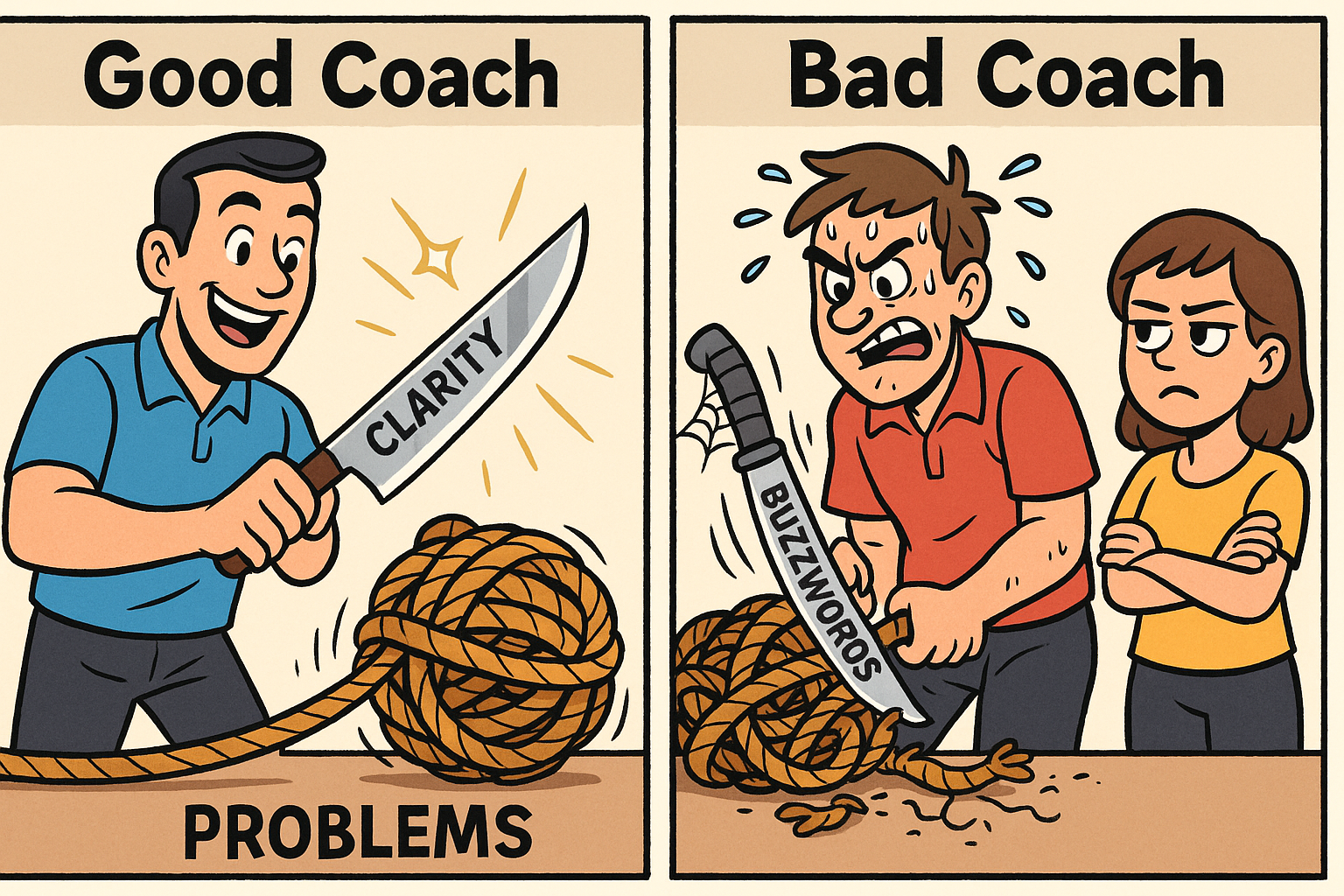Are you skeptial of life coaches? It’s good to be cautious!
Some years back, an old acquaintance moved into our area. He showed up just enough at community gatherings to invite you to his home—where he’d serve you gourmet food, make you feel like the most interesting person in the room, and casually drop hints about his seven-figure success story.
I thought I knew him. I thought that meant I could trust him. So when he pitched me on a $10,000 coaching program, I told myself he was either a scammer or really confident—and decided he must be the latter.
What I got for my $2,000 deposit was a few amateur videos and weekly Zoom calls where he taught high-pressure sales tactics that made me sick to my stomach. The realization I’d been misled didn’t hit all at once. It crept in as a quiet dread, then solidified when friends started calling with their own horror stories.
I wish I could tell you I spotted the signs from a mile away. I wish I could say I knew all along he was a skilled scammer but an amateur coach. But I didn’t. I let my guard down, acted out of urgency, and made an emotional decision despite the risks.
And that’s the scary truth: anyone can be scammed and not even know it. It’s not about being gullible, it’s about being human. Scammers don’t depend on “foolish” people. They depend on normal instincts like trust, urgency, and hope—the same instincts that make us open to real opportunities.
The worst part is, scams like this don’t just hurt the people who fall for them. They stain the entire coaching industry. One person’s greed can cast a long shadow over hundreds of skilled, ethical coaches who are doing the work for the right reasons.
But don’t worry. We’ll discuss how you can protect yourself from being taken advantage of by bad coaches. But first let’s consider what makes someone a “bad coach.”
What makes a good coach different from a bad one?
Abraham Lincoln said, “Whatever you are, be a good one.” This is an idea that goes all the back to Socrates, Plato, and Aristotle. It’s called it teleological ethics. Basically, everything in this world serves a purpose, just like a knife is meant to cut. What makes something good, therefore, is when it serves that purpose well—like when a knife is sharp, that makes it a good knife.
Similarly, the purpose of any life coach is to make a positive difference in your life. If they can make that difference—as long as you do your part, too—then they’re a good coach. But if they can’t make that difference, what does it mean? First of all, it doesn’t necessarily mean they’re a bad person. They might have a lot of redeeming qualities that attracted you in the first place. But they’re not qualified for the role they’ve assumed. And it’s not a good sign that they don’t realize or admit that! They’re either intentionally deceiving you, or they don’t know what they don’t know.
Sales and marketing are important skills that help life coaches connect with new clients. But gaining clients doesn’t automatically make them qualified to actually help them! That’s why sales and marketing skills aren’t the qualifications that determine the difference between a good coach and a bad one. What really makes a good coach different from a bad one is what happens after you sign up.
A good coach:
Is a master of their craft.
Puts your interests above their profits.
Uses a framework or process that can stand up to scrutiny.
Makes sure your interests are aligned with their offer before you commit.
Empowers you to gradually stand on your own two feet.
A bad coach:
Can’t deliver results.
Puts their own profits first.
Makes things up as they go.
Pressures you to buy.
Keeps you dependent.
The same standards apply to coaches who train other coaches. If they teach coaches how to master their craft and find clients, then they’re helping them develop both integrity and success. But if they teach only sales and marketing, assuming or pretending that their students are automatically qualified to help others, it’s just a pyramid scheme:
An endless chain of coaches coaching coaches to coach coaches. No thanks!
Filter out the scams and amateurs.
I don’t waste time debating with scam coaches or amateurs anymore—I just walk away. And you should, too. But first, you need to be able to spot them. Everyone needs a filter to separate real professionals from manipulative pretenders. Over time, I’ve refined a simple 5-part filter that I now run every coach, mentor, or program through before I invest a single dollar or minute of trust.
1. Check Their Reputation.
Just because you don’t see complaints on their official platforms doesn’t mean they don’t exist.
🔍 Check outside sources like reviews, forums, and community groups.
🗣 Ask discreetly by contacting past clients or mutual contacts.
2. Figure out how their program works.
Just because someone’s really nice doesn’t mean they can help you.
🧠 Ask them how their program works, and how exactly it will help you.
✅ Look for clear steps, measurable results, and real testimonials.
3. Look at Your other options.
Just because you have an urgent need for change doesn’t mean they’re your only option.
🔍 Explore your options.
❌ If they take offense and turn up the pressure, walk away.
4. Compare their prices to industry standards.
Just because someone charges a ton of money doesn’t mean they’re worth it.
🌱 Start small, and only invest more if they deliver.
5. See how they make you feel.
Just because they’re confident, doesn’t mean they’re giving you good advice.
✅ Sessions should make you feel clear, confident, and motivated to grow.
❌ They shouldn’t make you confused, pressured to spend more, or isolated from other perspectives.
Here’s my promise to you.
If you’re considering working with me, I want it to be because you we’re building trust and aligned in serving your interests, not because you were swept up in the moment.
That’s why I’ll never rush you into a decision, act like I’m your only option, or expect you to go all in from the very beginning. I’ll never lock you into something you can’t afford, and I’ll never make you feel bad for asking me challenging questions.
Instead, I will show you my commitment to excellence in serving you personally. And you can take your time, ask me anything you need to, and see for yourself how my program works before you commit. That way, you’re not just taking my word for it. We’re building a foundation of trust so we can make that positive difference in your life!
Trust, when placed wisely, allows you to grow.
Now that you know what to watch out for, it’s worth remembering that caution doesn’t have to be the end of the road for you. Caution is a mindset to help you avoid the scams out there. But if you reject all help just to play it safe, you might miss out on just the opportunity you need. Caution is limiting by nature. But the whole reason you’re considering coaching in the first place is because you want to grow.
At the end of the day, trust begins with yourself. You need to reach a place where you can trust your own judgement in someone else. So if you’re confident in your own judgement, then move forward without hesitation.
But if you’ve been misled before, like me, or you worry about talented scammers taking advantage of your unconscious instincts, follow the principles I laid out above. Test out the waters before you dive in. And take your time. Just don’t wait so long that unresolved issues are causing more problems than you’re avoiding by not finding able help.
Trust, when placed wisely, allows you to grow. It is expansive by nature, because it allows you to connect with people who can benefit you. A good coach helps you to clarify what’s important to you, so you have a positive foundation to make meaningful changes in your life. They help you see the unconscious beliefs and fears that are blocking your progress. They hold you accountable, so you can feel like your choices matter and learn from mistakes. And they encourage you when you’re having a hard day.
In these ways, trusting a good coach can be a real gamechanger in your life.



